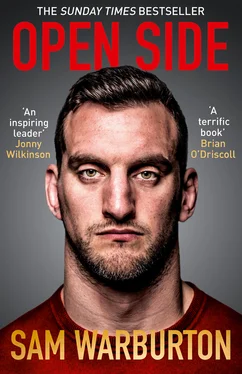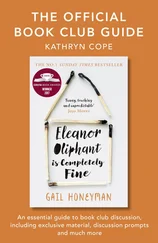Saturday, 30 May. Our first match is against Canada. I’m a sub, which is always much harder than starting. When you’re starting, you know your timings and you can work backwards off them. When you’re a sub, all that’s out of the window. You might be on in the first minute, or the fiftieth, or not at all. If you use an energy gel, when do you take it? Too early or too late, and it won’t be effective. The starting XV have first dibs on strapping and so on in the dressing-room, which is of course entirely right, but it does mean that the subs can feel rushed in their own preparations. Everything’s a little bit out of sync when you’re a sub, basically.
We make reasonably heavy weather of the game. At one stage, not long after half-time, it’s 16–16, and we have to work hard to get more than one score ahead and close it out 32–23. All through the second half I’m waiting for coach Robin McBryde to give me the nod. There are seven of us on the bench, and one by one they go on until it’s just me and Nicky Robinson left. Canada have emptied their bench, but we’re still sitting there like lemons.
Two minutes left, and the game looks safe. Come on , I think. Give me a runout. Even if I don’t touch the ball or make a tackle, at least I’ll have got it over with. Good or bad, long or short, it doesn’t matter.
For almost 80 minutes I’ve been on edge, warming up now and then, trying not to get ahead of myself but still being ready for anything.
It never happens. The final whistle goes, and I’m still on the bench. What a comedown. After all that, what a massive anti-climax. I feel like crying. I’ve got so much energy that I could run round the pitch non-stop for all of those 80 minutes I didn’t get to play.
That night, on the phone to Mum, I do cry. I let all my frustration flow out while she listens and does her best to comfort me.
‘Mum,’ I say, ‘can you put Ted on?’
Ted’s my dog. He’s a rough collie, and he’s named after Teddy Sheringham, one of my Spurs heroes. He’s very vocal, and he likes to talk to me: howling and woofing and barking when I make noises. His favourite sounds are the theme tune to Coronation Street and the sound of an ice-cream van, so I sit in my room in Toronto and sing these down the phone to him. Ted howls them back to me, which makes me start crying all over again.
Saturday, 6 June. One week later. We’re playing the USA at Toyota Stadium in Chicago. Again I’m on the bench, and I’m thinking that if I don’t get on this time I’m going to explode. Surely they’ll bring me on? What would be the point of taking me all the way to North America and not giving me any game time?
Eight and a half thousand miles away, though I’m only very dimly aware of it, the British and Irish Lions are playing Free State on their tour of South Africa.
Here in Chicago, the USA kick off, Ryan catches it, is hit in the tackle – and is knocked out. Literally in the first minute. I’m back-row cover. If Ryan comes off, I’m on. Robin turns to me. ‘Get ready.’
Ryan doesn’t come off immediately. He stays on, hoping that if he’s out there long enough he’ll recover. Am I coming on or not? Ryan doesn’t look too great, but it’s not my call.
Thoughts whirl through my head. What do you want? To come on at 50, like you presumed you would? Or now, before you have time to think about it? Are you ready? Doesn’t matter. You have to be ready when they need you.
With 19 minutes gone, Robin and the medics have seen enough. Ryan’s groggy and not playing anywhere like he usually does. Off he comes. On I go. There’s more than an hour left to play. This is it. I’m a Wales player now, and no one can take that away from me.
Blimey, it’s quick. Doesn’t matter that this is ‘only’ the USA, who are a rung or two down from the highest echelons of world rugby, and doesn’t matter that we run out easy winners, 48–15. It’s noticeably quicker than the Heineken Cup, which is itself noticeably quicker than the Magners League. It’s as though someone’s running it at normal speed plus a half. The passes, the runners, the tackles, all coming fast and relentless, and I have to concentrate more fiercely than ever before just to keep up.
That concentration and the physical effort take their toll – even though I didn’t play the first 20 minutes, I find myself cramping up with 10 minutes to go, which I find out later happens to lots of new caps as they get used to the pace of the game – but I play pretty well.
Back at the hotel, I find myself in the lift with team manager Alan Phillips.
‘You had a good game out there,’ he says.
‘Thank you.’
‘You know what I think? I think we’ve found the next Martyn Williams.’
Friday, 16 October. There’s a bug going round the Blues camp before we play a Heineken Cup match away to Sale Sharks. I’ve got it too, a bad chest infection, but even though I’m an international player now I still feel too young to assert myself properly. So I play. I feel terrible, and I play even worse than that. I give away two tries all on my own.
It’s the worst professional game I’ll ever play, but it teaches me another lesson: illness is as bad as an injury, so treat it like one. If you’ve got the flu or the shits, pull yourself out. The fans won’t know that you’re crook, and they won’t care either. You’re not doing yourself, your team or your reputation any favours. This isn’t playing for the local second XV, making up the numbers or filling in for a mate. This is your livelihood now. If you’re not there, you can’t play badly.
Friday, 13 November . My second cap against Samoa, but in many ways it feels like my first proper match: my first start, my first playing at 7, my first at home. Samoa have history in Cardiff – they won World Cup matches here in both 1991 (when they were called ‘Western Samoa’, leading to lots of resigned jokes about how it was lucky we hadn’t played the whole of Samoa) and 1999.
Just over one minute gone. We break through the middle and Dwayne feeds me on the inside. There’s no defender in front of me and for a split second I sense glory, but in the next stride David Lemi tackles me and then knocks the ball from my grasp just as I’m about to pop it up to Huw Bennett. Another reminder of how narrow the margins are at this level. In a club match, I could well have been in under the posts.
It’s a scrappy game – we’re playing in our change yellow kit, which doesn’t feel at all Welsh – and though we win 17–13, we should close it out much earlier than we do. I play pretty well, though a knock-on reminds me that Ben was right when he said my handling needs to improve, and like most of our forwards I seem to spend half the match clinging onto Henry Tuilagi, who’s basically a wrecking ball in a blue shirt and the hardest guy to tackle I’ve ever come across.
The next day, I’m going up an escalator in the St David’s 2 shopping centre when I hear someone saying, ‘That’s Sam Warburton.’ Rach and I try not to laugh, not because it’s not flattering but because it feels a bit weird. No one’s ever said ‘That’s Sam Warburton’ before. It’s the first tiny taste of something I’ll have to get used to over the years: not of being famous, because I genuinely don’t think that’s a word that can ever be applied to me, but of being locally well recognised.
Saturday, 28 November. I come off the bench against Australia. The match is memorable for two reasons.
First, Australia hammer us, scoring three tries in the first 25 minutes, and – though obviously I don’t yet know it – it’s the start of a miserable personal run in a Welsh shirt against Australia. By the time my career comes to an end I’ll have played for Wales against Australia ten times, and lost the lot.
Читать дальше












